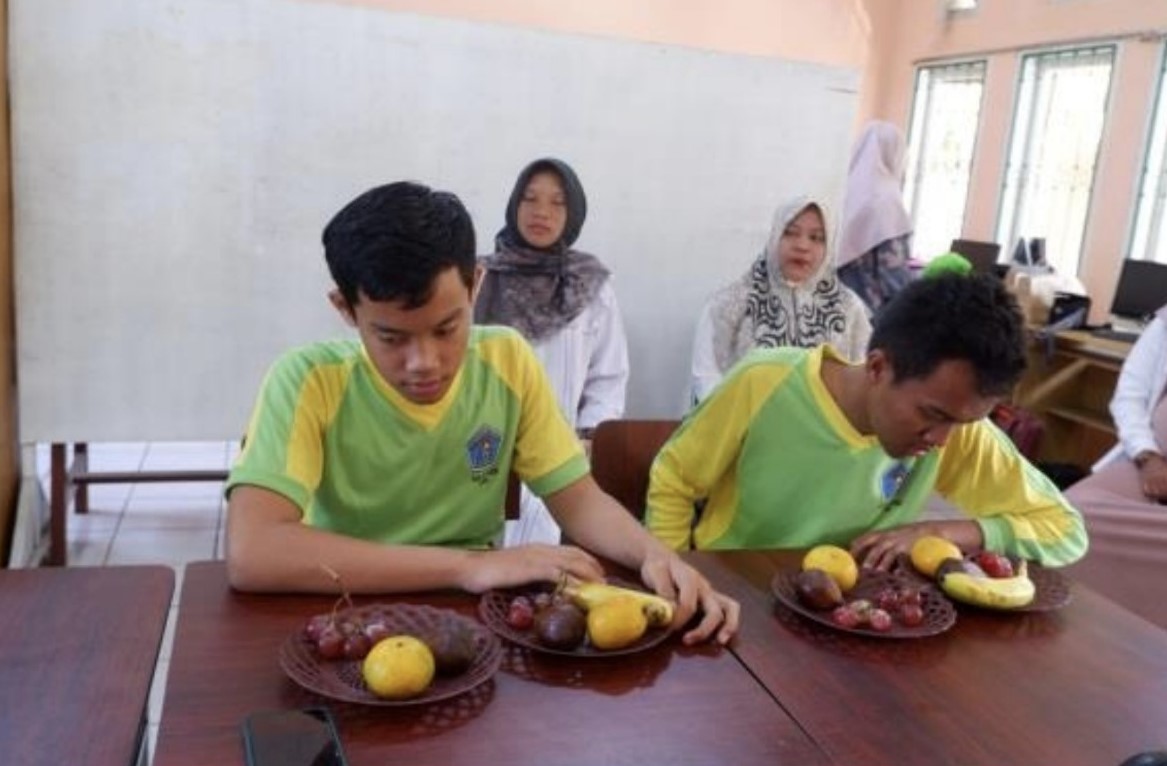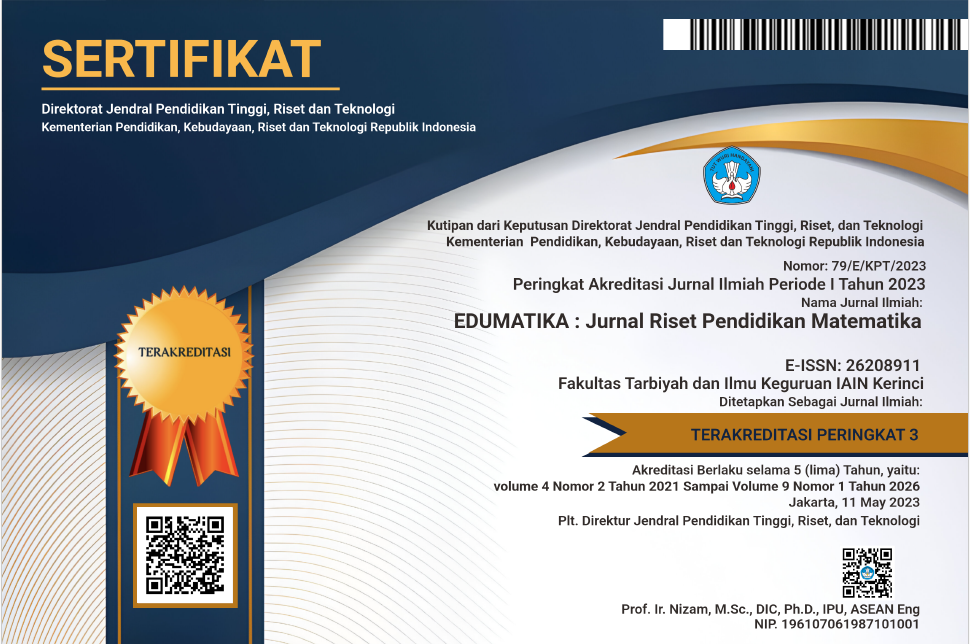Enhancing the Enthusiasm of Blind Students through Set Operation Learning Using Fruits Context: A Lesson Study
Abstract
This research aims to enhance the enthusiasm of blind students in learning set operations using the lesson study approach within the context of fruits. This research is motivated by the challenges of presenting the abstract concept of set operations to blind students, who often require media and teaching methods tailored to their conditions. Lesson study, as a collaborative cycle among teachers, is expected to facilitate the development of effective learning strategies. Meanwhile, fruits were chosen as the context because of their characteristics that are close to students' daily lives and easily accessible through the sense of touch. This research method uses design research adapted to the stages of lesson study: Plan, Do, See, and Redesign. Data collection techniques using observation of student activities and documentation. Data analysis was conducted using descriptive qualitative methods to understand how the use of fruits context in lesson study can enhance the enthusiasm and understanding of blind students in learning set operations. The research results are expected to contribute to the development of inclusive mathematics education for blind students, as well as provide practical recommendations for teachers in implementing lesson study and using learning media that meet the needs of the students.
Downloads
References
Anggi, R. P., Hennilawati, & Nurbaiti. (2023). Penerapan Pendekatan Matematika Realistik (PMR) Untuk Meningkatkan Hasil Belajar Matematika Siswa Kelas IV SD Negeri 200212 Padangsidimpuan. JURNAL JIPDAS (Jurnal Ilmiah Pendidikan Dasar), 3(2), 346–354. https://doi.org/10.37081/jipdas.v3i2.538
Agustina, A., & Putri, R. I. I. (2020). Calculation of electric account as learning context based on project based learning (PBL) and lesson study for learning community (LSLC). Journal of Physics: Conference Series, 1657(1). https://doi.org/10.1088/17426596/1657/1/012063.
Asari, S. (2017). Sharing And Jumping Task In Collaborative Teaching And Learning Process. DIDAKTIKA : Jurnal Pemikiran Pendidikan, 23(2), 184. https://doi.org/10.30587/didaktika.v23i2.28.
Browder, D. M., Spooner, F., Ahlgrim-Delzell, L., Harris, A. A., & Wakeman, S. Y. (2014). A meta-analysis on teaching mathematics to students with significant cognitive disabilities. Exceptional Children, 80(4), 423–446. https://doi.org/10.1177/001440290807400401
Fauziah, A., Putri, R. I. I., Zulkardi, & Somakim. (2020). Developing pmri learning environment through lesson study for pre-service primary school teacher. Journal on Mathematics Education, 11(2), 193–208. https://doi.org/10.22342/jme.11.2.10914.193-208.
Fernandez, C., & Yoshida, M. (2012). Lesson study: A Japanese approach to improving mathematics teaching and learning. Routledge. https://doi.org/10.4324/9781410610867
Freudenthal, H. (1991). Revisiting mathematics education: China lectures. Kluwer Academic Publishers. https://doi.org/10.1007/0-306-47202-3
Gravemeijer, K., & Cobb, P. (2006). Design research from a learning design perspective. In J. van den Akker, K. Gravemeijer, S. Mckenney, & N. Nieveen (Eds.). Educational Design Research (pp. 15-51). Routledge. https://doi.org/10.4324/9780203088364
Hasneli, H., & Riska, F. M. A. (2019). Gambaran Aktualisasi Diri Penyandang Tuna Netra (Studi pada Boy Sandi Penyanyi Minang). Al-Qalb : Jurnal Psikologi Islam, 9(1), 32–40. https://doi.org/10.15548/alqalb.v9i1.851
Kanellopoulou, E.-M., & Darra, M. (2019). The Implementation of the Lesson Study in Basic Teacher Education: A Research Review. Higher Education Studies, 9(3), 65. https://doi.org/10.5539/hes.v9n3p65.
Kankhar, M. A., & Mahender, C. N. (2025, May). A Comprehensive Study of Tactile Education System for Visual Impaired People. In International Conference on Recent Advancements and Modernisations in Sustainable Intelligent Technologies and Applications (RAMSITA 2025) (pp. 88-99). Atlantis Press. https://doi.org/10.2991/978-94-6463-716-8_8
Kelly, S. M. (2009). Use of assistive technology by students with visual impairments: Findings from a national survey. Journal of Visual Impairment & Blindness, 103(8), 470-480. https://doi.org/10.1177/0145482X0910300805
Kholik, A., Bisri, H., Lathifah, Z. K., Kartakusumah, B., Maufur, M., & Prasetyo, T. (2022). Impelementasi Kurikulum Merdeka Belajar Kampus Merdeka (MBKM) Berdasarkan Persepsi Dosen dan Mahasiswa. Jurnal Basicedu, 6(1), 738–748. https://doi.org/10.31004/basicedu.v6i1.2045
Klingenberg, O. G., Holkesvik, A. H., & Augestad, L. B. (2019). Research evidence for mathematics education for students with visual impairment: A systematic review. Cogent Education, 6(1), 1626322. https://doi.org/10.1080/2331186X.2019.1626322
Kusumah, Y. S., & Nurhasanah, F. (2017). The endless long-term program of mathematics teacher professional development in Indonesia. Professional Development of Mathematics Teachers, Mathematics Education-An Asian Perspective, 33–45. https://doi.org/10.1007/978-981-10-2598-3_3
Lewis, C. (2020). Conclusion: How do we judge the success of lesson study adaptations?. In Stepping up lesson study (pp. 116-120). Routledge. https://www.taylorfrancis.com/chapters/edit/10.4324/9781003002536-12/conclusion-catherine-lewis
Liando, M. A. J. (2022). Peningkatan Hasil Belajar Matematika pada Materi Pecahan dengan Menggunakan Pendekatan Pendidikan Matematika Realistik (PMR) Pada Siswa Kelas IV SD Gmim Malola. EduTIK: Jurnal Pendidikan Teknologi Informasi Dan Komunikasi, 2(2), 193–204
Messiou, K., & Ainscow, M. (2020). Inclusive Inquiry: Student–teacher dialogue as a means of promoting inclusion in schools. British Educational Research Journal, 46(3), 670-687. https://doi.org/10.1002/berj.3602
Nuraida, E. M., & Putri, R. I. I. (2018). Implementasi lesson study dalam pembelajaran matematika materi perkalian dan pembagian bilangan bulat peserta didik kelas vii. Seminar Nasional Pendidikan Matematika, 42–47. https://seminar.uad.ac.id/index.php/sendikmad/article/view/1062
Nuraida, E. M., & Putri, R. I. I. (2019). the Context of Archipelago Traditional Cake To Explore Students’ Understanding in Integers Division Class Vii. Jurnal Pendidikan Matematika, 14(1), 91–100. https://doi.org/10.22342/jpm.14.1.7400.91-100
Octriana, I., Putri, R. I. I., & Nurjannah, N. (2019). Penalaran Matematis Siswa Dalam Pembelajaran Pola Bilangan Menggunakan Pmri Dan Lslc. Jurnal Pendidikan Matematika, 13(2), 131–142. https://doi.org/10.22342/jpm.13.2.6714.131-142
Plomp, T. (2007). Educational Design Research. In T. Plomp & N. Nieveen (Eds). An introduction to educational design research (pp. 9-35). SLO. https://slo.nl/publish/pages/4474/educational-design-research-part-a.pdf
Putri, R. I. I., & Zulkardi, Z. (2019). Designing Jumping Task on Percent using PMRI and Collaborative Learning. International Journal on Emerging Mathematics Education, 3(1), 105. https://doi.org/10.12928/ijeme.v3i1.12208
Rahayu, P. T., & Putri, R. I. I. (2021). The Data Package in Learning Mean Using LSLC and PMRI. Jurnal Pendidikan Matematika, 15(1), 61–70. https://doi.org/10.22342/jpm.15.1.9431.61-70
Rusiyanti, R. H., Zulkardi, & Ilma, R. (2021). Literature Study on the Impact of Mathematics Learning Implementation with Lesson Study for Learning Community (LSLC). Proceedings of the International Conference of Mathematics and Mathematics Education (I-CMME 2021), 597, 246–250. https://doi.org/10.2991/assehr.k.211122.034
Sato, M. (2014). Dialog dan Kolaborasi di Sekolah Menengah Pertama Praktek “Learning Community.” PELITA.
Setiarani, Suci & Suchyadi, Y. (2018). Pola Asuh Orang Tua Terhadap Anak Tunanetra Berprestasi Usia Sekolah Dasar. Jurnal Pengajaran & Pendidikan Guru Sekolah Dasar, 1(1). DOI:10.33751/jppguseda.v1i01.866
Sumarni, S., Putri, R. I. I., & Andika, W. D. (2021). Project Based Learning (PBL) Based Lesson Study for Learning Community (LSLC) in kindergarten. Jurnal Obsesi : Jurnal Pendidikan Anak Usia Dini, 6(2), 989–996. https://doi.org/10.31004/obsesi.v6i2.1637
Van den Heuvel-Panhuizen, M., & Drijvers, P. (2014). Realistic mathematics education. In S. Lerman (Ed.), Encyclopedia of mathematics education (pp. 521–525). Springer. https://doi.org/10.1007/978-3-030-15789-0

Copyright (c) 2025 Elis Muslimah Nuraida, Meirisa Sahanata, Fitri Kumala Dewi, Hedia Rizki

This work is licensed under a Creative Commons Attribution 4.0 International License.














